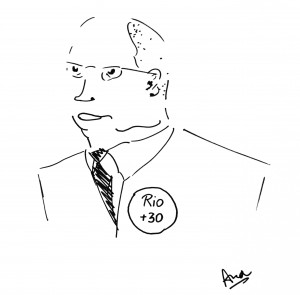by Adrian Fernandez Jauregui
There is frustration and irritation revisiting, once more, the hallways and negotiating rooms of the UN Commission on Sustainable Development (CSD). Despite the commonly used rhetoric about “moving forward” and “streamlining the text”, progress is slow and the outcome is uncertain.
In Working Group I negotiations (section three and five of the zero draft), the discussion on the Green economy is where disagreements between delegations are most fierce. In this section, crucial points for most countries are being negotiated and every one pulls in their own direction while trying to aim some low blows at anyone who opposes. What is more interesting is that there doesn’t seem to be a clear alliance. At least for now, we aren’t seeing the usual North vs South dichotomy. Some of the most contentious issues are the Green Economy roadmap; also related with commitments, deadlines, targets and goals; and technology transfer, information sharing, and economic assistance.
When the EU pushes for a road-map (the number one point for the EU), the G77 is not hesitant to bracket and delete any mention of the so called road-map. The EU idea of a green economy road-map is a set of commonly accepted guidelines that would be used to achieve commonly agreed goals. In theory this road-map should direct national and international policies, and create regulations that work for a green economy. Ironically enough, the green economy is not clearly defined but some important elements of it would be the phasing out of subsidies, especially those that are harmful to the environment (e.g. tuna fisheries and gasoline), the use of financial mechanisms to leverage natural services, and the main-streaming of green technology (energy and resource efficient, and not carbon intensive). The G77 is not a fan of this road-map for a number of reasons.
One of the most fundamental reasons is that the idea of commonly agreed targets and goals with the combination of specific commitments resembles too closely the infamous structural reforms that took place (and to a certain extent still do) in the vast majority of developing countries, imposed as a condition of foreign aid. The sovereign right of states to decide how they carry on their sustainable development programs is paramount to the G77. For them there is no one roadmap, but as Rene Orellana, head of the delegation of Bolivia, said “if necessary, there must be as many roadmaps as there are countries”
Another issue is that, in the eyes of the G77, the Earth Summit is not about transitioning to a Green Economy, it’s about Sustainable Development. Although those two might overlap, if there is a conversation about road-map it shouldn’t be towards the green economy, but towards sustainable development!
While the US, Canada, the Republic of Korea and New Zealand seem to share a common position with the G77 about committing to specific actions, deadlines, targets and goals, their reasons are diametrically opposed. From the perspective of those developed countries, anyone who rejects the idea of committing to the European road-map represents more expenses in the form of Official Development Assistance (ODA). These developed countries plus Norway, Japan and Australia among others see the green economy as an opportunity to guarantee access to new markets (green markets) for technology and information that enhance resource and energy efficiency. It is their priority to make sure that the document highlights the importance of intellectual property rights regulations and that transferring such property is determined in a bilateral basis (sold at the highest price that the market permits).
Many European countries are keen on the idea having the private sector play a greater role and share more responsibilities (whenever it is profitable) with the public sector. They are also major champions of protecting the markets of green technology and information. For the EU delegation, the way to achieve sustainability is to make it profitable. Once green technology (solar and wind energy, and more efficient and low carbon intensive ways of production) becomes more profitable than the alternative (carbon intensive sources of energy, and industries that use them) …. Thus, when the discussion is about markets and the role of the private sector they all join forces against the G77, criticizing their “unwillingness to achieve an agreement” and their insistence on “blocking the process”.
The perception of the G77 is slightly different. They wonder: now that we have more dynamic economies using technology that the industrialized world has used for decades you want to regulate and ban these technologies, so that you can sell us your new technology? There are a number of reasons to doubt of the intentions of those who preach the need to shift to more sustainable ways of production, but refuse to talk about more sustainable ways of consumption; the underlying problem.
After two weeks of negotiation the hyper inflated text has barely been reduced to nearly one hundred pages (of the no more than 20 pages they initially hoped to materialize). There is only two days left and the final outcome is not in sight. The question for us following the negotiations is: how are they going to reconcile their opposing positions?



